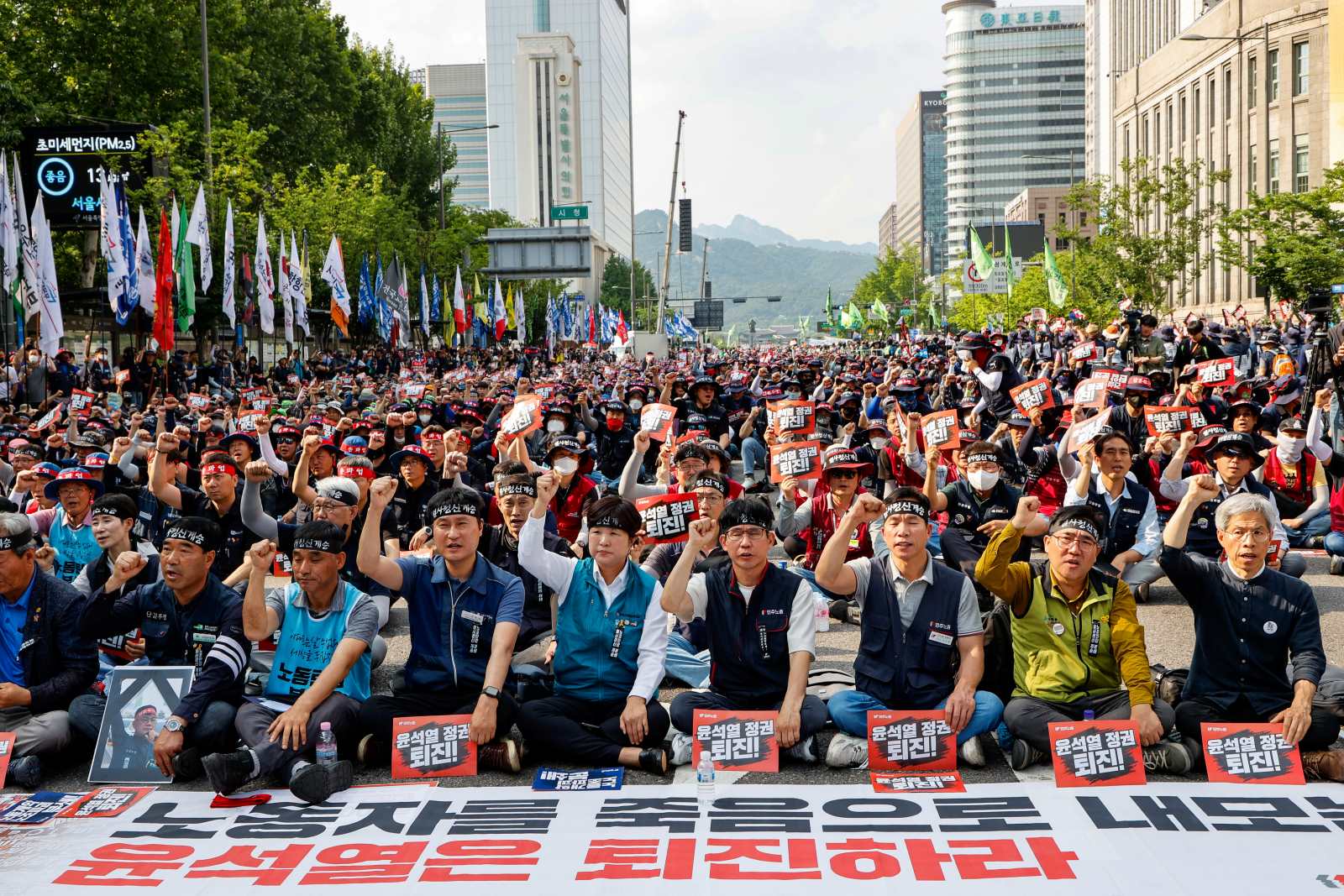“Development”
False promises, questionable term

The term “development” originally comes from biology and suggests an evolutionary process. In the context of policies concerning social, economic and political matters, “development” is seen as a linear maturation process culminating in an ideal state. The term has had this normative meaning since US President Harry Truman stated in 1949 that the “development” of “underdeveloped” countries was a central goal of his foreign policy.
To criticise a term and its impact, one first needs a clear definition of it. But for the past 70 years, the term “development” has been filled with various, often contradicting meanings.
Strategies of “development” have ranged from modernisation and structural adjustment with a focus on industrialisation and economic growth, to a focus on satisfying basic human needs (Basic Needs Strategy) and reducing poverty (Millennium Development Goals – MDGs). More recently, “development” has also embraced sustainability (Sustainable Development Goals – SDGs). The SDGs apply to industrialised countries as well. They conceive of all nations as developing nations that must continue to develop according to shared but differentiated responsibilities.
All these strategies have something in common, despite their shifting focus on different aspects: “development” points out deficiency and prescribes a universal way to fix it.
Colonial legacies
The long history of the “development” debate is marked by some consistent features:
- “Development” was always regarded as normatively good and universally desirable. The term implies a promise of prosperity with consumption levels matching the western model. At the same time, the negative consequences that development projects have for the intended beneficiaries are typically neglected. For example, even well-intended programmes and policies often weaken social systems and local economies, thus creating dependencies and vulnerabilities. Infrastructure projects such as major dams, for example, cause displacement, resettlement and loss of livelihoods. An estimated 10 million people lose their homes in the name of “development” every year (see Peripherie No. 154/155, and also note article by Korinna Horta in Focus section of D+C/E+Z e-Paper 2020/09).
- In the decisionmaking apparatus concerning “development”, only people with western education can claim to be experts. Local and indigenous knowledge usually counts for nothing. However, the employees of development agencies often have only a vague understanding of life in the societies they want to change. Typically, they do not even speak the languages of the people concerned.
- Development-policy action is typically an intervention in societies that are defined as foreign. The promise of “development” makes interventions seem necessary and morally imperative. Technical projects and apolitical programmes are presented as solutions to problems of inequality. Though power relations matter very much, they are typically ignored. Aid agencies pretend that the dominance of social forces that benefit from large land holdings, for example, or from global capitalism do not matter.
- The west’s standard of living is posited as the ideal and universally desirable. Other societies are regarded as backward in relation to it. Such thinking essentially reflects a colonial mindset and perpetuates colonial hierarchies. Indicators such as gross domestic product or the UN’s Human Development Index assume that a “good life” is measurable. Other important factors such as hospitality, wellbeing, equality are swept aside – as are institutionalised racism and the imperial mode of living, that is dependent upon systems of production, extractivism and consumption that depend on cheap labour and resources from far-away places.
In sum, Eurocentric paternalism has always tainted the “development” debate. Colonial notions and assumptions about power continue to shape “development” rhetoric. Critical scholars, on the other hand, question the entire development narrative with Europe at its centre. The current globalised world order is historically rooted in colonialism, imperialism and slavery. Moreover, many “development” projects are designed mainly to serve the interests of donors in the global north.
Sustainable development
In spite of all the “development” talk, the gap between the global rich and poor has been widening year after year. This is true in spite of some progress in areas such as literacy or maternal mortality. In view of the climate crisis, moreover, the consumer lifestyle seen in the west is becoming ever less sustainable. The more other countries copy this model, the more impossible it becomes to achieve global sustainability.
The SDGs are supposedly a list of goals and indicators for people, societies, nature and the environment to interact sustainably, but they are riddled with inherent contradictions. The growth goal of SDG 8, for example, is plainly inconsistent with global sustainability. European policies relating to the economy and “development” typically measure success in economic terms. As long as the growth paradigm persists, “development” will never lead to sustainability. Worse still, the term “development” is used to legitimise the overexploitation of nature.
There are, however, alternatives to the western way of life and its economic paradigm. A collection of essays titled “Pluriverse – A post-development dictionary” (Kothari et al, 2019), edited by Ashish Kothari and others, presents a variety of views from different parts of the world on what can be considered the hallmarks of a “good life”. Relevant issues include:
- interpersonal solidarity instead of permanent competition,
- interdependence between human and non-human beings and
- autonomous communities and societies.
These critical scholars condemn the overextraction of resources and demount the unthinking faith in economic growth. They question the wisdom of perpetuating development policies that have turned our geological era into the Anthropocene in which human activity is changing the climate and the global environment.
Alternatives to “development”
If we assume for a moment that the goal of “development” was ever really to eradicate poverty and global inequality, then one thing is strikingly clear: “development” has failed miserably, in both vision and practice. What we need now is a radical policy change. We must address the historical roots of global inequality. We need systemic and structural solutions. In the words of Gurminder K. Bhambra, a professor of postcolonial studies at the University of Sussex, “inextricable combination of the rhetoric of modernity (progress, development, growth) and the logic of coloniality (poverty, misery, inequality), has to be central to any discussion of contemporary global inequalities and the historical basis of their emergence”.
Focusing on global inequalities shows that change is most urgently needed in the global north. Its current level of consumption perpetuates injustice – and so does its continued claim to hegemony. Colonial legacies are at the root cause of the power asymmetry of north and south.
Jason Hickel, an economic anthropologist and a fellow of the Royal Society of Arts in London, has spelled out tangible proposals to achieve a fairer global economy (see Sabine Balk in Focus Section of D+C/E+Z e-Paper 2018/11). Among other thing, he calls for:
- the democratisation of international financial institutions (World Bank, IMF),
- global tax justice and transparency,
- fair trade and fair wages,
- debt relief for highly indebted countries, and
- the re-regulation of intellectual property rights concerning pharmaceuticals and agriculture to the benefit of the poor.
Simply redefining the term “development”, or extending it as in the case of the SDGs, will not do. The world remains mired in thinking based on competition and the notion of western superiority. To overcome global inequality, these modes of thought must be replaced. In their place, we need an ethos of global justice and solidarity.
Further reading
Bhambra, G.K., 2014: Postcolonial and decolonial dialogues. In: Postcolonial Studies, Vol. 17, Issue 2, pages 115-121.
Hickel, J., 2017: The divide. A brief guide to global inequality and its solutions. London, Penguin Random House.
Kothari, A., et al (ed.), 2019: Pluriverse – A post-development dictionary. New Delhi, Authors UpFront.
Peripherie, 2019: Vertreibung durch Entwicklungsprojekte. No. 154/155, Vol. 39 2019 (Peripherie is a German academic journal).
Aram Ziai is professor of development policy and postcolonial studies at the University of Kassel.
ziai@uni-kassel.de
Julia Schöneberg is a post-doctoral researcher in the project “Theorising Post-Development” at the University of Kassel. The project is funded by DFG (Deutsche Forschungsgemeinschaft, a German research funding organisation)
julia.schoeneberg@uni-kassel.de









